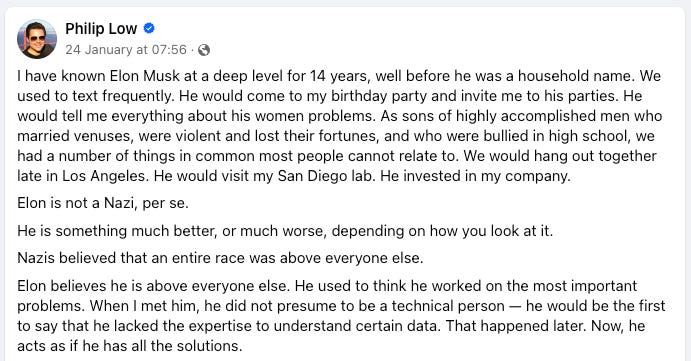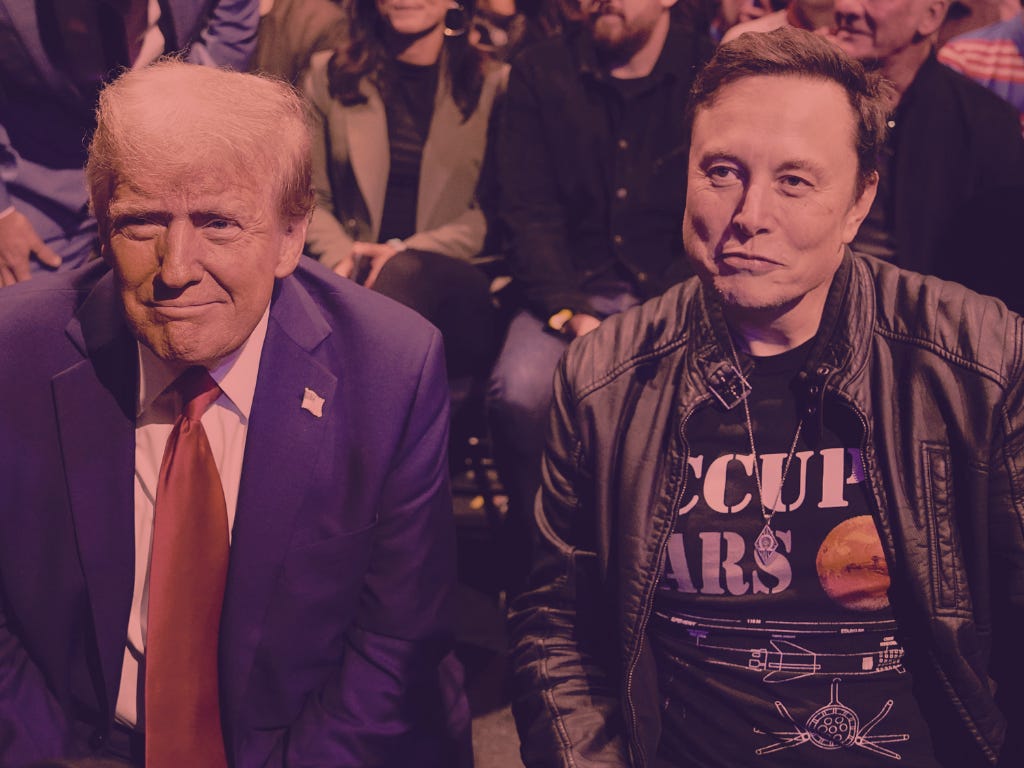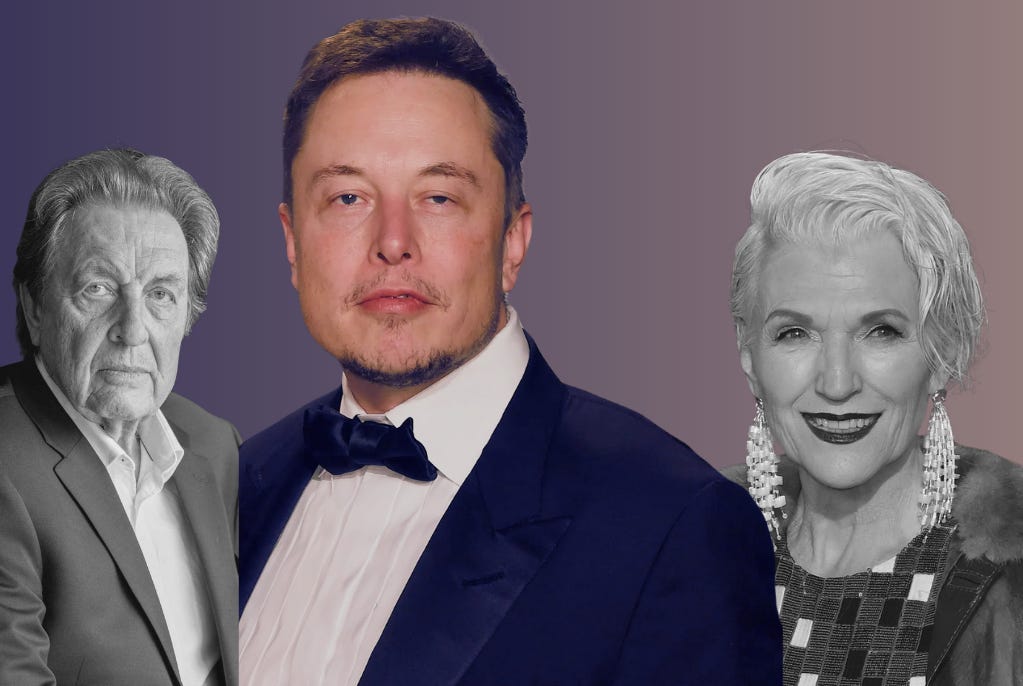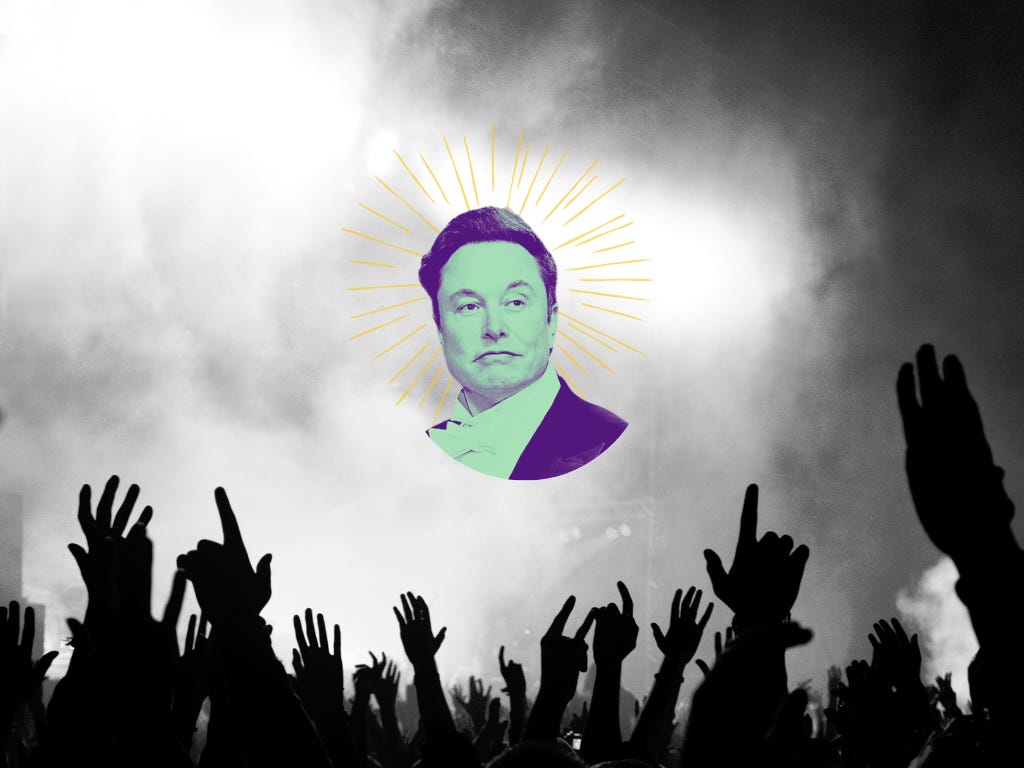Elon Musk: The Man, The Myth, The Flaws - A Human Analysis
What Musk's journey reveals about human nature

There’s no argument that Elon Musk is one of the most polarising and most-talked about figures of our time. I never intended to write this piece, but Philip Low’s recent post stirred something in me. Low’s words provided an interesting glimpse into Elon Musk’s personal relationships, something I had always suspected but never fully articulated. Musk is a fascinating enigma; someone whose life story has been meticulously curated and mythologised. Low’s reflections made me take a deeper look at Musk, not as a tech visionary or billionaire, but as a human being shaped by his past, his relationships, and his unyielding need for control.
i. The Origin of Elon Musk — Childhood shaped by Trauma and Power
Elon Musk’s early years were defined by contradictions — raised with immense privilege, yet his home life was marked by emotional turbulence and social alienation. Born in Pretoria, South Africa, in 1971, he was the son of Errol Musk, an engineer who amassed significant wealth from real estate, emerald mining, and various business ventures1. His father’s businesses allowed them to own multiple properties, travel internationally, and employ household staff, luxuries far beyond the reach of most South African families during apartheid.
Despite the material wealth, Musk’s home life was far from idyllic. His parents’ marriage was turbulent, and they divorced when he was around eight years old. His mother, Maye Musk, has described Errol as controlling and sometimes cruel figure, and Elon has spoken about his father in even stronger terms, calling him “evil” and claiming he was emotionally and psychologically abusive2. Errol himself has admitted to having multiple affairs and father children with different women, including his stepdaughter3, a revelation that further complicates Musk’s perception of his father.
After the divorce, Elon chose to live with his father, a decision he would later regret. He’s said that Errol would frequently belittle him, demean his intelligence, and make him feel inadequate. He has described the experience as deeply scaring, “He was a terrible human being. Almost every evil thing you could think of, he has done.”4
Adding to the emotional struggles at home, Musk was also bullied relentlessly at Pretoria Boys High School5. When he was around 12 years old, a group of older boys threw him down a flight of concrete stairs and beat him so badly he lost consciousness and had to be hospitalised. He was frequently ostracised and tormented which deepened his sense of isolation and contributed to his early fascination with technology, which became both an escape and obsession.
ii. The Role of Parental Influence in His Decision Making
Elon’s parents shaped his personality in starkly different ways. Errol’s domineering and volatile nature instilled in him both a deep-seated drive for control and a lifelong aversion to authority, while Maye’s resilience and independence served as a counterbalance, demonstrating the value of perseverance and self-reliance.
Errol Musk is an intelligent man — an engineer, property developer, and entrepreneur who built fortune in real estate and mining, at one point owning an emerald mine in Zambia. However, those close to him describe him as deeply difficult, manipulative, and morally questionable.
In contrast, Maye Musk is often seen as the resilient parent who forged her own success despite personal struggles. Born in Canada and raised in South Africa, Maye was an ambitious woman who built a career as a model, dietician, and entrepreneur, often balancing multiple jobs to support her children. She has spoken about the financial struggles she endured, despite coming from an upper-middle-class background, she had to work long hours, move frequently, and at times, rely on food stamps when living in Canada.
This interplay between Elon’s parents’ influences is evident in his approach to business and relationships. From Errol, Elon inherited technical brilliance, bold risk-taking, and an unshakeable confidence in his own vision, but also a distrust of authority, an unwillingness to accept criticism, and a harsh, often abrasive leadership style. From Maye, Elon learned resilience, adaptability, and the ability to endure hardship.
Elon is often seen as someone who rejects limits and defies expectations. It’s a mindset that may have been fueled by a subconscious need to prove himself beyond his father’s legacy. However, his struggles with personal relationships, his intense need for control, and his controversial leadership tactics suggest that his father’s influence lingers, even as he seeks to distance himself from it.
iii. Romantic Relationships — A Pattern of Power and Detachment
Elon Musk’s approach to romantic relationships reflects the same priorities that define his professional life — work comes first, everything else must adapt. His partners have often been intelligent, driven and independent women, yet over time, the dynamics of his relationships have revealed a pattern: his partners must bend their lives around his relentless pursuit of his work. This approach, rooted in logic over emotion, leaves little room for traditional relationship dynamics, where emotional reciprocity and mutual compromise are expected.
Philip Low’s recent revelations shed more light on Musk’s personal struggles, particularly his difficulty navigating emotional closeness. According to Low, Musk often confided in him about his “women problems” and past relationships paint a picture of a man whose need for efficiency and pragmatism often takes precedence over emotional discourse.
In an interview, he bluntly stated, “If I’m not in love, if I’m not with a long-term companion, I cannot be happy”6. But despite this need for companionship, Musk has never been one to adjust his life to accommodate relationship. He has frequently emphasised rationality over emotional expression, even in deeply personal matters. He remarked that he sees relationships as a “risk-reward calculation”. While most seek love for companionship, intimacy and mutual growth, Musk’s approach is far more functional — a partnership must complement his life goals, not interfere with them.
His relationships may be significant to him, but they are secondary to his greater mission, one that has little room for the traditional messiness of human emotion.
iv. Business and Power — Innovation, Influence and Ethical Dilemmas
Elon Musk’s name has become synonymous with groundbreaking technological advancements. Tesla has revolutionised the electric vehicle market, SpaceX has made commercial space travel a reality, and Neuralink and xAI promise to push the boundaries of artificial intelligence and neuroscience. Musk has cultivated the image of a singular genius propelling humanity forward, but his role in these innovations is often more as an orchestrator than an originator. While he has played an undeniable role in accelerating progress, his approach to power, competition, and control raises critical ethical questions about the long-term impact of his decisions.
Musk did not start Tesla. He joined the company in 2004 as an investor and chairman after the real founders, Martin Eberhard and Marc Tarpenning, had already laid the groundwork. He later maneuvered to take control, leading to a legal battle over the title of “co-founder”7. At SpaceX, the success of the company is largely credited to the engineers and experts who execute his ambitious visions. His influence is more akin to that of a high-stakes venture capitalist with an exceptional strategic mastery to push projects beyond conventional limits, rather than the lone scientist or engineer he’s sometimes portrayed as.
His ability to pivot industries at breakneck speed means he constantly makes bold claims about the future; promises of fully autonomous Tesla vehicles, colonising Mars, or integrating AI with the human brain8. However, the push of these ambitious goals usually comes with unforeseeable ethical concerns. Neuralink, for example, is developing brain-machine interfaces that could redefine human cognition and treatment of neurological disorders, but the potential for misuse — whether by government, corporations, or bad actors — remains largely unexplored. Similarly, his advocacy for AI safety while simultaneously pushing for its rapid development through xAI presents a paradox. Is Elon Musk guiding AI’s future responsibly, or simply ensuring his own influence over its trajectory?
v. The “Cult of Elon” — A Myth of His Own Making
We have all been “sold” an Elon Musk story. The tale of a lone genius battling against entrenched industries and bureaucratic stagnation is a powerful one, but it’s only half true. His ability to capture the public’s imagination has transformed him from an entrepreneur into a tech messiah; a figure revered not just for what he builds, but for what he symbolises: rebellion, disruption, and the promise of an extraordinary future.
According to Low, Musk’s most impressive invention is himself. Musk’s charisma is undeniable, but it is a performance. Many of Musk’s most ambitious projects succeed because of the brilliant engineers and scientists working behind the scenes. Their contributions are, most oftentimes, overshadowed by Musk’s larger-than-life presence. His dominance in social media allows him to bypass traditional scrutiny, speaking directly to millions who see him as an anti-establishment figure. His fans don’t just support his companies; they defend his every move. His personal life, political shifts, and erratic decision-making are excused because the mythology demands it — the genius must be misunderstood, the system must be against him, his vision must be too grand for the average person to grasp.
But the danger of idolising billionaires (or anyone) is that it blinds us to the realities of power. Low argues that Musk’s need for control extends beyond business. He dominates conversations, narratives, and perceptions. His fans enable this, failing to ask the crucial question of what happens when a single man amasses this much influence with no counterbalance? Musk isn’t a rogue genius fighting the system; he is the system, shaping industries, policies, and even global conflicts with little oversight. The risk won’t be that Musk will fail, it’s that he will succeed in ways we are not prepared for.
vi. The Ethics of Power and the Politics of Influence
Musk’s political affiliations are as unpredictable as his business decisions. He has supported both liberal and far-right causes, but Low suggests that his true motivation is in control, not ideology. His recent political play, ranging from endorsing controversial figures to amplifying conspiracy theories, are not the actions of a man with consistent worldview. They are the moves of someone who understands that influence is the most value currency. As Low pointed out, Musk is less concerned with governance or ethics than he is with ensuring that he is always the one setting the terms.
His acquisition of Twitter (now X) is a perfect example. He framed the purchase as a crusade for free speech, but his decisions like banning journalists critical of him9 while reinstating figures who push extremist narratives, reveal something else — control over the discourse itself. The platform has now become an extension of his influence10, allowing him to shape conversations, crush dissent and uplift his own brand. Low has described Musk’s leadership as not about innovation, but about domination, a clear pattern in how he uses his wealth to reshape industries and policies to his advantage. It seems, no one can dictate the future without him.
This raises a critical ethical question — who holds Musk accountable? When a single individual has the ability to influence elections, geopolitical conflicts, and the flow of information, the checks and balances of democracy become fragile. The world is watching the unchecked rise of a man who, as Low warns, does not answer to anyone but himself.
vii. The Impact of Broken Relationships and Why They Matter
Musk’s transactional nature extends beyond politics and business, it defines his personal and professional relationships. Those who have worked closely with him, from longtime allies to co-founders, have often found themselves discarded once they no longer serve his interests. Low has spoken openly about Musk’s inability to maintain long-term personal connections, noting that Musk’s loyalty is to his vision, not to the people who help build it. Sergey Brin, Google’s co-founder, once a personal friend, severed ties with Musk after a highly publicised scandal11, illustrating how quickly relationships collapse when personal ambition takes precedence over trust. The same pattern played out with Sam Altman12, who co-founded OpenAI with Musk, only to find Musk attempting to take full control. When his bid for dominance failed, Musk walked away, only to later attacked the very organisation he once championed.
Musk has initially positioned himself as OpenAI’s benefactor, advocating for an open, ethical approach to artificial intelligence. But when the company shifted toward a structure that limited Musk’s influence, he withdrew funding, undermined its leadership, and then sought to discredit its work. His creation of xAI was not just an act of competition, it was a declaration that if he couldn’t control AI’s future, he would build his own alternative. It shows a pattern: when collaboration no longer bends to his will, he does not adapt but destroys to rebuild in his own image.
His severed relationships reveal something more than an aversion to compromise, they highlight a deep discomfort with shared authority. Whether in business, friendships, or even romantic partnerships, Musk does not adjust to those around him. Those who push back or attempt to establish their own autonomy eventually find themselves cast aside.
(Read email correspondence between Musk and OpenAI team portraying Musk as a former ally turned adversary who tried to take control, left when he couldn’t, then attacked OpenAI when they succeeded. OpenAI argue that their mission remains the same, while Musk’s stance has shifted based on his personal ambitions)
viii. The Larger Implications — The Humanity of the Billionaire Class
And Musk isn’t alone. The billionaire class often follows a similar trajectory; starting with ambitious, sometimes idealistic visions, only to shift toward consolidating power once their influence grows. Figures like Musk, and even Donald Trump, show a pattern — charismatic, larger-than-life personas who present themselves as disruptors, railing against the establishment while amassing control over industries, politics, and public discourse.

Both Musk and Trump leverage their platforms, whether X or political rallies, to shape public narratives in their favour. Both have a knack for turning personal grievances into mass movements, gaining loyal followers who see them as anti-elite champions, despite being among the wealthiest and most powerful individuals on the planet. Their strategy? Dismiss critics as biased, frame opposition as corrupt, and cultivate an aura of indispensability.
Society’s tendency to idolise billionaires hides an important truth: no single individual can save the world. Progress is, and always has been, the result of collective effort rather than the will of a solitary genius.
Seeing Through the Smoke
Elon Musk is, in many ways, an interesting figure in the world of technological progress. His willingness to take risks and break conventions has undeniably propelled industries forward. But his tendency to blur the lines between vision and control raises ethical questions about whether innovation at all costs can ultimately serve the greater good, or whether it risks concentrating power in ways the world has yet to grasp in full.
Musk is not a villain, nor is he a hero. Whether in business, tech or personal connections, Musk moves with a singular belief that he alone is best suited to steer the future.
Musk’s story should be a reminder of why we must be cautious of power that goes unchecked. He has positioned himself at the centre of industries that shape our world — energy, space travel, artificial intelligence, social discourse — though his actions often reflect personal vendettas rather than a sense of shared responsibility. As Low pointed out, Musk’s loyalty is not to people, institutions, or even ethics, but to the vision he alone deems worthy. And when that vision is challenged, he does not negotiate, he eliminates, reinvents or bypass any obstacle.
What is Elon Musk truly chasing? Is it innovation? Power? Validation? Or is he simply fulfilling a deep-seated need to prove himself, to be remembered, to leave an imprint on history?
The greatest illusion of figures like Musk is that they make us believe they are the sole architects of progress, that without them, innovation halts, and the future dims. That is simply not true. The power to create change — to build, to innovate, to challenge, to uplift — has always existed within people who refuse to be bystanders in history. The world may feel like it’s burning on all sides, but we are not powerless. We do not need saviours — we need communities, ideas, and institutions that place humanity above the whims of a single individual.
Perhaps the real progress begins when we stop searching for heroes and start believing in our own power to shape the world.
“I am no longer accepting the things I cannot change. I am changing the things I cannot accept.”
— Angela Davis, an American political activist and lifelong critic of capitalism, imperialism, and racial injustice
Ashlee Vance, Elon Musk: Tesla, SpaceX, and the Quest for a Fantastic Future (HarperCollins, 2015)
https://www.nzherald.co.nz/business/billionaire-space-pioneer-elon-musk-has-branded-his-father-evil/7IHVQ4HYWW24BNWLJ62M3NDHLI/
https://www.scmp.com/magazines/style/celebrity/article/3188639/completely-normal-errol-musk-dating-his-stepdaughter-jana
https://www.investopedia.com/articles/personal-finance/061015/how-elon-musk-became-elon-musk.asp
https://www.independent.co.uk/life-style/elon-musk-spacex-tesla-a7950601.html
https://www.cnbc.com/2017/11/15/why-elon-musk-says-he-needs-to-be-in-love-to-live-a-happy-life.html
Tim Higgins, Power Play: Tesla, Elon Musk, and the Bet of the Century (Doubleday, 2021)
https://edition.cnn.com/2019/05/02/tech/elon-musk-predictions/index.html
https://en.wikipedia.org/wiki/December_2022_Twitter_suspensions
https://www.vanityfair.com/news/2022/04/elon-musk-twitter-terrible-things-hes-said-and-done?srsltid=AfmBOoqnN_8bGDCSBaZvo_ufQ3P94zO_b2tp3ff3A5dtCZ4b7PV8TnVh
https://www.businessinsider.nl/elon-musk-reportedly-dropped-to-his-knees-and-begged-for-forgiveness-after-his-affair-with-google-co-founder-sergey-brins-wife/
Walter Isaacson, Elon Musk (Simon & Schuster, 2023)






I wonder if Musk ever went to a therapist or had any kind of treatment for all his childhood traumas?
I actually do think he is a villain, albeit made, not born. He surely would score high on a dark tetrad personality test: Machiavellian, narcissistic, psychopathic and sadistic.